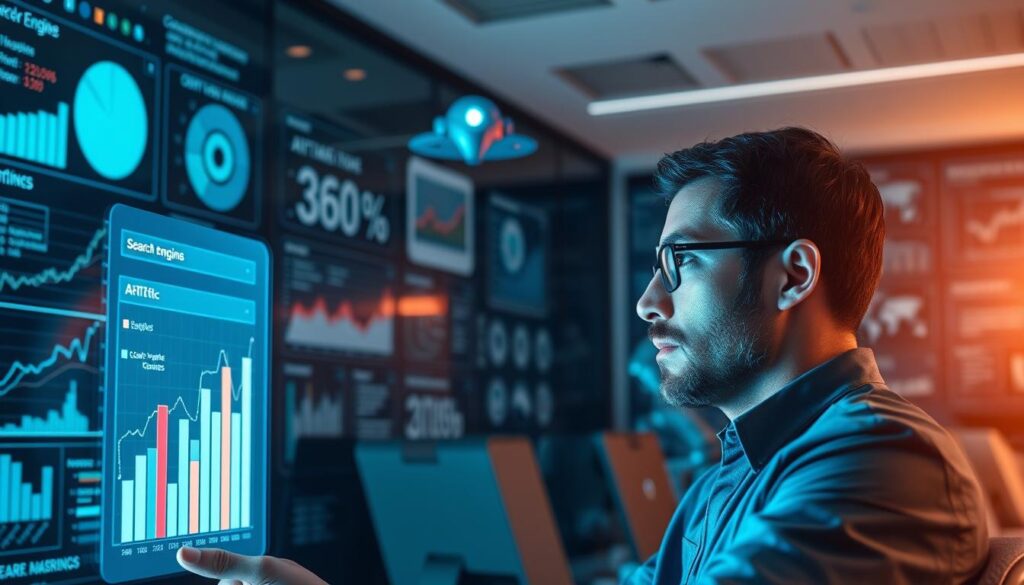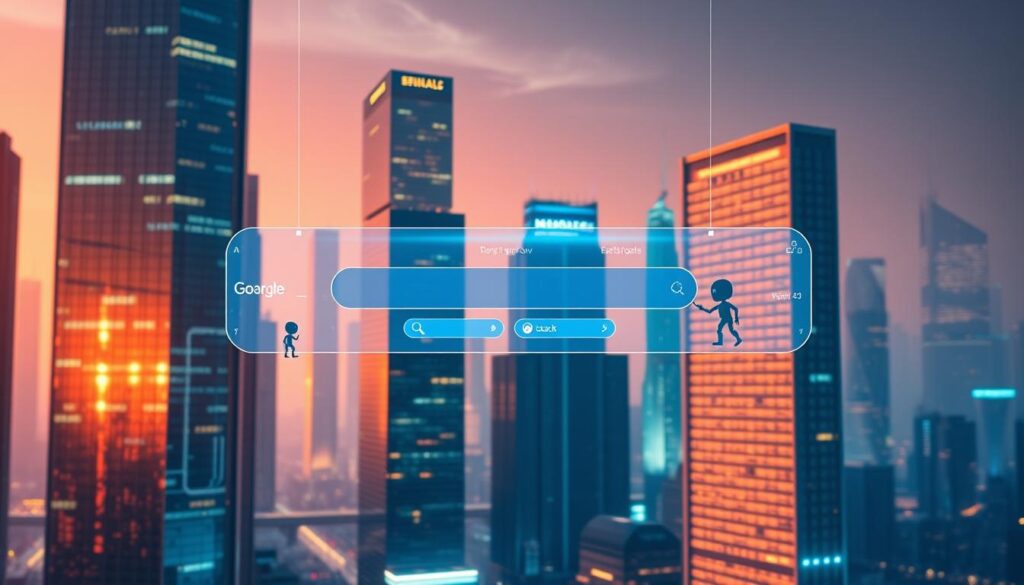As we explore the digital marketing world, a big question stands out: how will AI change search engine optimisation’s future? AI’s effect on SEO is clear, and businesses must adjust.
AI is changing search algorithms and making content better. It’s key to keep up in the online world. This article will show how AI is changing SEO, from better keyword research to improving web pages.
Table of Contents
Key Takeaways
- AI’s role in shaping the future of search engine optimisation
- The impact of AI on search algorithms and content strategies
- Adapting to AI-driven changes in SEO
- Balancing AI with human expertise in digital marketing
- Enhancing online presence through AI-driven SEO strategies
The Current State of AI in Search Engine Optimisation
AI has changed how search engines work. Tools like Google’s RankBrain have made search results more accurate and tailored to each user.
How Search Engines Currently Utilise AI
Google and Bing use AI to better their services. AI helps them understand what users really want, giving them better results.
Google’s AI-Powered Ranking Factors
Google’s AI looks at things like how easy a site is to use and how relevant its content is. This means users get the best results for their searches.
Bing and Other Engines’ AI Implementation
Bing and others also use AI to improve their search abilities. For example, Bing’s AI makes image and video searches better. For more on AI in search, check out this guide on Generative Engine Optimization.
Key AI Technologies Already Influencing SEO
AI technologies like machine learning and natural language processing (NLP) are shaping SEO. They help search engines get to know what users like and want.
| AI Technology | Impact on SEO |
|---|---|
| Machine Learning | Improves search result relevance |
| NLP | Enhances understanding of search queries |
Understanding AI Technologies Transforming SEO
AI is key for businesses wanting to lead in the digital world. It changes how search engines work and how we optimise. This is a big deal.
AI technologies like machine learning, natural language processing, and computer vision are changing SEO. They help search engines understand what users want and rank content better.
Machine Learning in SEO Applications
Machine learning helps businesses make content that really speaks to their audience. It’s all about making search results more relevant.
Supervised vs Unsupervised Learning in Search
Supervised learning uses labelled data, while unsupervised learning finds patterns in unlabelled data. Both are used to make search results more accurate.
How Search Engines Train Their ML Models
Search engines use lots of data to train their models. This includes user interactions and content metadata. It helps them understand what users really want.
Natural Language Processing (NLP) in SEO
NLP is vital for search engines to get language. It’s especially important for voice search optimisation. It lets search engines grasp the subtleties of human speech.
Computer Vision and Multimedia Search Optimisation
Computer vision is becoming more important for multimedia search. It helps search engines understand and index visual content better.
| AI Technology | SEO Application | Impact on Search |
|---|---|---|
| Machine Learning | Content optimisation | Improved result relevance |
| NLP | Voice search optimisation | Better understanding of user queries |
| Computer Vision | Multimedia search | Enhanced visual content indexing |
Google’s AI Innovations Shaping Search
Google’s AI innovations are changing the way we search. They’ve made search results more accurate and personal. It’s important to keep up with these changes for better SEO strategies.
BERT, MUM, and LaMDA Explained
Google’s tools like BERT, MUM, and LaMDA are key to better search results. BERT helps understand natural language better. MUM can handle complex queries and give detailed answers. LaMDA makes search conversations feel more human.
How Google’s AI Updates Have Changed Rankings
Google’s AI updates have changed how we rank search results. Now, rankings focus more on content relevance and user experience.
Core Updates and Their AI Components
Core updates use AI to make search results more accurate. They help match search results with what users really want.
Measuring the Impact of AI Algorithm Changes
SEO experts need to watch how AI changes affect rankings. They should adjust their strategies as needed. Here’s a table showing how key AI updates have changed SEO rankings:
| AI Update | Impact on SEO | Key Changes |
|---|---|---|
| BERT | Improved natural language understanding | Better handling of long-tail queries |
| MUM | Enhanced complex query understanding | More comprehensive search results |
| LaMDA | Conversational search improvements | Human-like responses in search |
Experts say, “The future of SEO is all about adapting to AI changes.” For more on digital marketing trends, see Blogking’s insights.
The Future of AI in Search Engine Optimization
AI is changing fast, making SEO more predictive, personalized, and efficient. AI will keep shaping SEO in the future.
Predicted AI Developments in the Next 5 Years
In the next five years, AI will bring big changes to SEO. Predictive analytics will help businesses get ready for algorithm and user behavior changes.
AI tools will get better, making SEO trends forecasting more accurate. This means businesses can be proactive, not just reactive.
| Predicted Development | Impact on SEO |
|---|---|
| Advanced Predictive Analytics | More accurate forecasting of SEO trends |
| Enhanced AI-driven Tools | More effective optimization strategies |
| Personalization | More tailored search results and user experiences |
Long-term Transformation of Search Through AI
AI will change search a lot, making it more intuitive and user-focused. Search engines will get better at understanding human language and behavior.
The Potential End of Traditional Keyword Optimisation
AI might make traditional keyword optimization less important. Search engines will focus more on content relevance and user intent.
“The future of SEO is not just about optimizing for search engines, but about creating a better user experience.”
Intent-Based Search and Its Implications
Intent-based search is a big change for search engines. It means focusing on what users really want. This changes SEO, as businesses need to understand and meet user needs.
As AI changes SEO, businesses must adapt to stay ahead. Knowing AI’s future and its effects can help businesses succeed in a fast-changing digital world.
AI-Powered Content Creation and Optimisation
AI tools are changing how we make and improve content for search engines. They save time and make content better and more relevant. This boosts SEO performance.
Content Generation Tools and Their SEO Impact
AI content tools are getting smarter, making high-quality content that people want to read. They look at lots of data to find trends. This helps content rank better in search results.
Distinguishing AI-Generated from Human Content
It’s getting harder to tell AI-made content from human-written stuff. “The line between AI-generated and human content is blurring,” says a report. This makes us think about AI’s role in content and SEO.
Google’s Stance on AI Content
Google doesn’t mind AI content, but it doesn’t like low-quality or spammy stuff. So, AI content can help with SEO if it’s good, relevant, and useful to users.
AI-Assisted Content Optimisation Strategies
AI helps with content optimisation by looking at how well it does and suggesting ways to get better. It can help with keywords, meta tags, and links. Using AI for optimisation can make SEO strategies stronger and increase online presence.
“AI is revolutionising the way we create and optimise content for search engines, making it more efficient and effective.”
Voice Search and Conversational AI
The rise of conversational AI is changing SEO. Voice search is now key for rankings. With voice assistants like Alexa and Google Assistant, how we search is evolving. Voice queries are longer and more like conversations.
Optimising for Voice-First Interactions
To get better at voice search, businesses must use NLP in SEO. They need to grasp the nuances of voice queries. These are often longer and more conversational than text searches.
For example, someone might type “best Italian restaurants London” but say “What are the best Italian restaurants in London?” with voice search. This means businesses must use more conversational phrases in their keywords.
Conversational Search Patterns and Their SEO Implications
Conversational search patterns are reshaping SEO. With voice search on the rise, understanding these patterns is vital for good SEO strategies.
Featured Snippets and Position Zero Optimisation
Featured snippets, or Position Zero, are key for voice search. Voice assistants often read out these snippets in response to voice queries. To rank well, businesses should aim for high-quality, concise content that answers user questions directly.
Long-tail Conversational Keywords
Long-tail conversational keywords are vital for voice search. These are specific phrases users might say when using voice search. By using these keywords, businesses can boost their voice search rankings.
| Optimisation Strategy | Description | SEO Impact |
|---|---|---|
| Natural Language Processing (NLP) | Understanding and incorporating conversational language into SEO strategies. | Improves voice search rankings by matching user query patterns. |
| Featured Snippets Optimisation | Creating content that directly answers user queries to secure Position Zero. | Enhances visibility in voice search results. |
| Long-tail Conversational Keywords | Incorporating specific phrases that mimic voice search queries. | Increases relevance and ranking for voice searches. |
AI-Driven Technical SEO Advancements
AI is changing how we do technical SEO. It uses machine learning to make website optimisation easier. This means companies can now do more technical SEO tasks automatically.
Automated Site Auditing and Issue Detection
AI tools can do detailed site audits. They find technical problems that might hurt search rankings. These tools spot issues like broken links and mobile problems quickly.
Predictive Analytics for Technical Performance
AI’s predictive analytics can spot future technical problems. This lets companies fix issues before they cause trouble. It’s key for keeping good search rankings and user experience.
AI Tools for Schema Markup and Structured Data
AI helps with schema markup and structured data. It automates the process. This makes sure search engines understand websites better, boosting visibility.
Automating Schema Implementation
AI tools make schema implementation easier. They reduce the need for manual work and cut down on mistakes. This ensures schema markup is applied right across the site.
Entity Recognition and Knowledge Graphs
AI helps create knowledge graphs by recognising entities. This makes brands look more credible to search engines. It can improve search visibility and brand reputation.
| AI-Driven Technical SEO Advancements | Benefits |
|---|---|
| Automated Site Auditing | Identifies technical issues, improves site health |
| Predictive Analytics | Prevents technical performance issues, ensures optimal site speed |
| AI Tools for Schema Markup | Enhances search engine understanding, improves visibility |
For a detailed technical SEO checklist with AI, check out our guide on technical SEO checklist for 2025.
SEO Automation Through Artificial Intelligence
SEO automation with AI is changing digital marketing. It makes processes smoother and more efficient. AI tools help by analysing data, giving tips, and taking actions to boost website rankings.
A top digital marketing expert says, “AI in SEO saves time and adds precision we couldn’t get before.” This precision is key in today’s fast-paced digital world.
Automated Keyword Research and Analysis
AI makes keyword research better by quickly and accurately analysing huge data sets. It finds the right keywords, predicts trends, and offers content tips. This lets SEO experts work on bigger, more important tasks.
AI-Powered Competitor Analysis
AI tools for competitor analysis give insights into rivals’ plans, strengths, and weaknesses. By looking at competitors’ sites, content, and links, businesses can craft better SEO plans.
Scaling SEO Processes with AI Technology
AI helps businesses grow their SEO efforts efficiently. It automates simple tasks, so teams can handle more work without losing quality or accuracy.
The future of SEO is all about AI. It’s set to change the field even more.
User Experience Signals and AI Interpretation
AI is changing how we see user experience signals in SEO. It can now understand complex user interactions better. This gives search engines a deeper insight into how users behave.
How AI Evaluates User Engagement Metrics
AI looks at different user engagement metrics. It helps us see how users interact with web content. It checks things like how long users stay on a page and how often they click.
Core Web Vitals and AI Assessment
Core Web Vitals are key in SEO, and AI helps a lot here. It checks page loading times, how interactive a page is, and how stable it looks. This gives a full picture of a website’s user experience.
Behavioural Signals as Ranking Factors
AI uses behavioural signals like user clicks and scrolls to judge content quality. These signals help search engines see what users like. This way, rankings can be adjusted to better match user preferences.
Personalisation and Its Impact on Search Rankings
AI-driven personalisation is changing search rankings. Search engines aim to give users results that fit their tastes and search history. This is done through complex algorithms that study user behaviour and adjust results.
For example, Google’s AI helps make search results more personal. This makes the search experience better for users. Experts say, “The use of AI in search engines is changing how we find information online.”
“The future of search is not just about retrieving information, but about providing a seamless and intuitive user experience.”
- Improved user engagement through personalised content
- Enhanced search rankings based on user behaviour
- Better understanding of user experience signals
Ethical Considerations and Challenges of AI in SEO
Using AI in SEO brings up big ethical questions. We need to make sure our digital marketing is fair and open.
Potential Biases in AI-Driven Search
AI search algorithms can keep old biases if they’re trained on biased data. This can make search results unfair. For example, if an AI is mostly trained on data that favours some groups, others might get left out.
Balancing Automation with Human Expertise
AI can do a lot of SEO work, but humans are still key. They help understand results, make big decisions, and keep AI strategies ethical.
When AI Gets It Wrong: Limitations and Failures
AI isn’t perfect and can make errors, especially with new or tricky situations. Knowing its limits helps avoid bad effects on SEO plans.
The Continued Value of Human SEO Specialists
SEO experts add creativity, critical thinking, and ethics. They work well with AI’s analysis. Their role is vital for making sure SEO is both good and right.
Conclusion: Embracing the AI Revolution in SEO
AI is changing SEO, and businesses need to keep up to attract investors and succeed online. The use of ai technology in seo has made SEO better, faster, and more in tune with what people want.
The future of AI in SEO looks bright, with new tech on the horizon. Businesses that use AI can get more people to see their site, attract the right visitors, and make more money.
It’s important for businesses to keep up with AI and SEO news. This way, they can use AI to their advantage and meet their online marketing goals.
FAQ
How is AI currently being used in search engine optimisation?
AI helps search engines like Google and Bing improve search results. It also makes user experience better and automates SEO tasks. AI is also used in influencer marketing.
What AI technologies are transforming SEO?
Machine learning, natural language processing (NLP), and computer vision are key AI technologies in SEO. They help with content generation, optimisation, and technical SEO.
How has Google’s AI impacted search rankings?
Google’s AI, like BERT and MUM, has changed search rankings a lot. These updates make search results more relevant and accurate. They also change how SEO strategies are made.
What is the future of AI in SEO?
The future of AI in SEO will see more intent-based search and the end of traditional keyword optimisation. We can expect a more personalised and conversational search experience.
How can AI be used for content creation and optimisation?
AI can create high-quality content with its tools. AI can also help make content more relevant and rank better. But, it’s important to mix AI with human expertise for quality.
How does voice search and conversational AI impact SEO?
Voice search and conversational AI change how we interact with search engines. SEO strategies need to adapt to these changes. Optimising for voice and understanding conversational search is key.
What are the benefits of AI-driven technical SEO advancements?
AI-driven technical SEO advancements improve website performance and detect issues. They also help optimise technical SEO.
Can AI automate SEO processes?
Yes, AI can automate SEO processes like keyword research and content optimisation. AI makes SEO processes more efficient and scalable.
How does AI evaluate user experience signals?
AI looks at user experience signals like engagement and personalisation to affect search rankings. This makes search results more relevant and personalised.
What are the ethical considerations of AI in SEO?
AI in SEO raises ethical issues like potential biases and the need for human expertise. It’s important to use AI responsibly.
How can businesses prepare for the AI revolution in SEO?
Businesses should understand AI in SEO, keep up with new developments, and adapt their SEO strategies. Using AI-powered tools and techniques is key.







